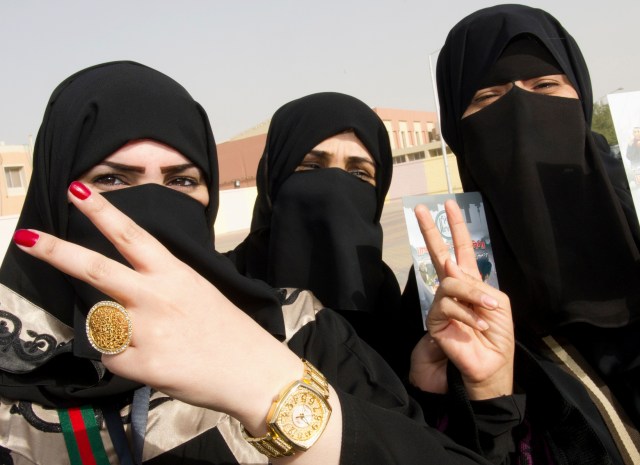Saudi Arabia is, to say the least, a man’s world. In fact, it’s consistently ranked one of the worst places for women worldwide. Women in the region require permission from a man to marry, divorce, or travel. It is illegal for them to drive a car. 60 percent of college degrees earned in the region — including PhDs — are awarded to women, but only 15 percent of the workforce is female. Conservative religious customs and old-standing tradition and law have rendered Saudi women almost powerless, and despite small gains, they remain far behind in their recent efforts for equality.
But when the government expressed an interest in increasing women’s civic and economic participation in the kingdom — granting women voting rights and instructing employers to open more employment opportunities up to women — a small crew of businesswomen made plans to leave, rather than stay. Instead of working to fit into a world created almost entirely to exclude and silence them, they planned to construct their own cities. And one of them will be finished next year.
Hofuf is home to an industrial site set to be completed next year and created entirely for the purpose of employing women. The site’s placement in Hofuf puts women in a major Saudi urban center; located close to residential neighborhoods, it is possible for women to commute. The development will create a multitude of opportunities for women while appeasing the longtime tradition of sex segregation in the region and the social customs that often make it impossible for a mixed-sex workplace to be efficient, safe, and successful.
The proposed site, perhaps unsurprisingly, has garnered a lot of controversy. Homa Khaleel wrote a scathing piece on the proposed cities in the Guardian. She finds them to be, simply put, an unthinkable option:
But how can further segregation be expected to solve the problems caused by discrimination? It takes a peculiar leap of logic to think the answer is instead to build whole new cities where women who choose to have careers can be herded. Would this be seen as acceptable, even progressive, if the cities were there to house workplaces for people of one race rather than one gender? But where are the voices calling for an end to the country’s discriminatory practices? There has been none of the broad support that would have ensued had the segregation been along race lines. In South Africa such segregation was the basis for a worldwide boycott, yet Saudi Arabia is merely seen as an “exceptional” place with a different culture.
Clerics will say that Islam does not allow women and men to mix at work, while the rulers explain that segregation is part of Saudi culture. Yet Islamic feminists have pointed out time and time again, that the prophet Muhammad himself was married to a businesswoman – with no need to hide in an all-women city. A culture that does not just segregate women, but enshrines in law that they are second-class citizens is hardly one worth preserving.
But for the 65 percent of Saudi women who desire financial independence, the 75 percent who remain unemployed, and the women under 25 who yearn to make good use of their degrees in the foreseeable future, a single-sex city may be just what they need.
The first of five planned women-only cities, Hofuf alone will offer 5,000 jobs in textiles, pharmaceuticals and food-processing, as well as opportunities for women to be at the helm and finally see women-driven product lines. The Saudi Industrial Property Authority, called Modon, released a statement from their deputy director general saying “women can demonstrate their efficiency in many aspects and clarify the industries that best suit their interests, nature and ability” within the city.
Hussa al-Aun, one of the businesswomen who proposed the series of cities to Modon, said it was “essential to cut unemployment among [the kingdom’s] female graduates.” Women working in the city will also be offered training and and opportunities to further develop their talents.
The implications of Hofuf have yet to be fully recognized, but from a historical standpoint, this could be the first step towards turning Saudi Arabia on its head, or on its elbows, or on its knees. In a region where women have historically been oppressed at a very extreme level, an entire city devoted to their potential and ambitions seems like it could be a major step forward for the women involved, although what it will mean for the future of Saudi Arabia as a nation remains impossible to predict. In the wake of the accepted proposal for the site, academics and journalists alike have harkened back to Jim Crow, arguments about same-sex education, and the failing logic of a segregated city. But that isn’t wholly fair. After all, same-sex education in America might not be our ideal now, but Wellesley and the other sister schools exist because at one point, the Ivy League was a big treehouse with an obnoxious “no girls allowed” sign attached to the front. At one point it was impossible for American women to get an education comparable to that of presidents, business owners, and other breadwinners — so they simply made their own space to do it. Sometimes you have to stop waiting to achieve equality alongside your oppressor and you have to pack up and go.

Achieving equality alongside men may not be possible for Saudi women at this point, who exist in a climate where they are policed socially as well as legally to remain silent, subordinate, and inactive — but they desire it. Hofuf is an opportunity for Saudi women to show their families, peers, and leaders that they have tangible skills and ambition, and at this point in their movement that seems a necessary step in order to create change in their benefit within the region. The idea that women have to prove to men anywhere on this planet that they have worth is frustrating and stupid, and we are right to react with confusion and anger at the premise that it is the only way. But that doesn’t change the fact that it also isn’t a novel concept, and that women still have to do that here.
Saudi women do not have time for gradualism. The kingdom which they call home is freedomless for them. Why should they continue to wait for slow political progress, and trust in individual public figures for their own liberation, when they can just pick up and go? Saudi women do not have time for gradual progress — but now they have the opportunity to explain and exhibit why it never made sense to wait in the first place.





I think it’s a brilliant idea & once they start bringing in that coin it will slowly help open the eyes of the men in power.
I’m quite shocked that this initiative would even happen in Saudi Arabia – that the government would grant this massive independence to women.
Also, I’d rather live in a women’s city.
Freakin’ awesome! I would totally vacay in that city.
I wish there was some way I could support their efforts…
I too think this is a brilliant workaround. I would guess that they will create a city of beauty and creativity, and become the envy of others. Their challenge then will be not to let their success be destroyed because it will pose a threat to the more traditional man. I will be excited to watch this development. I can see women educating themselves and finding their own power. I see the creation of a movement.
I hate to be a naysayer, but I’m very troubled and uncertain about this plan. As some of the critics say, it mirrors segregation and the notion of “separate but equal facilities.”
Is something better than nothing? Of course. If I were a Saudi woman, I’d probably be delighted at the prospect of a job and personal security.
But does that make it okay? Is this anything more than a governmental scheme to make sure that women remain cloistered, albeit in a larger box?
Obviously I hope for the best, but this proposal doesn’t feel like a success to me :-(
Not success, maybe, but progress towards success. Think about Howard or the all-black colleges the US started after the Civil War…it’s still separate, segregated education, yes, but in the end African Americans got degrees and proved they were capable. Probably also enjoyed just learning and not fighting off racist bullshit every day. I see this as a similar scenario: considering the other options for Saudi women, probably the best chance at proving their worth without the constraints of a male-based society.
I think the important difference here is that this “segregation” is being chosen by the minority group rather than imposed on them.
Separateness is not always an inherently bad thing – there are studies, for example, that show sex-segregated classrooms to be beneficial to some students. The word “segregation” has taken on negative connotations because of the truly horrible way that it was imposed on people of colour in the U.S., but that doesn’t mean that all circumstances of segregation are the same.
(Or rather it’s being chosen by the oppressed group, since women aren’t really a minority.)
I think this is awesome! But it’s a bit of a double edges sword. Considering the situation Saudi women are in, I think this is amazing, and a great opportunity to work and LIVE and be a lot more independent than in other cities.
On the flip side, it IS still segregation, and to have a super segregated community in a large country is hard to do. In my mind, I would love to see this happen, along with the support of an awesome supportive group of men and husbands
I think this is pretty bad ass. They have to start somewhere and this is a good place.
I am still not certain how I feel about this. However, I do like your point about universities made for women. That’s made me a little more open regarding this idea.
I’m very curious to see what will happen.
There’s a big difference between segregation and carving out space for ourselves.
It’s hard to tell from where I’m standing, but to me this seems like the latter–after all, it was proposed by Saudi businesswomen themselves.
I hope it goes well!
All the best to them, I hope they succeed.
I am in turmoil over the concepts presented in this article. My main thought is that is very thoughtfully written and I enjoyed reading the multiple perspectives on the matter. Thanks!
I totally agree. Great article on a complex topic.
Thanks for showing multiple sides of this story. I admit to mixed feelings, but as a student in my final year at a women’s college (Wellesley), I can say that a predominately female environment has really, REALLY helped me learn how to be confident and eloquent and argue for the things I want in life, when I had no idea how to do it before. I feel that, for women like me who wanted to be more outspoken but just didn’t have the tools (vocabulary, a support network, a spine), a single-gender environment is a big help in getting the confidence to learn to do that. I feel the arguments against single-sex spaces–segregation, separate-but-equal, etc.–come more into play in the long-term scenario, like if these women’s cities become the ONLY place that women can live and be employed, or if they can’t go from these places back to traditional spaces and have the same jobs and authority. I think as a learning environment and a proving ground, places like this can help shape women who can go out and make change in the patriarchal world outside.
hope this makes sense, I’m a little sleep deprived
Virginia Woolf called.
She said hi.
She also said this is a brilliant experiment, and it’s almost like her work ‘A Room of One’s Own’ come alive on a macro scale.
I like the different perspectives on the issue and the comments above. Another concern I have about this project is whether the fathers, husbands and brothers will even let the women go to these cities and work or go to school. It seems to me they still have the power to take this opportunity away from them.
I’m also very, very worried that this was made possible as a way to ensure women are “cloistered, albeit in a larger box” as @Em-Power-Me said…
That’s the real question here: will the women in their city be free only to work, or will they be allowed also to drive a car? Will they need a male’s permission to step out of the door?
I believe in first steps, but I am not so sure whether this is really a step forward. Anyway I wish them success!
I’d be very interested to see how this works in practise. I think it’s completely appalling that this type of workaround should have to occur, but from an experimental point of view, I’d be interested in the results.
Considering the percentage of graduates that are female there, I could see this working pretty efficiently. It is a rare chance to find out exactly what a female-dominated workforce is like (since we have plenty of data on the opposite!)
The reason the sex segregation that is found in Saudi Arabia is awful is that is is enforced by those with the power – the men.
This is a case of the women deciding to segregate themselves for other reasons and so they can focus all their energy on working with other women. It’s not perfect but I still think it is completely different in this case.
Amaaaazing news!
This is awesome. I hope it works out for them!
Thanks for sharing this information. It’s definitely complicated, but I agree with your assessment in the last couple paragraphs.
I’m also fascinated by the statistics on Saudi women earning university degrees. I had no idea. I in no way intend to dismiss the extreme horror that women suffer in Saudia Arabia, but the fact that they’re so well-educated does bode well for future feminist progress within the kingdom.
um, how would you like it if you had to leave your family and go to some city because your misogynistic government was too uncomfortable to watch your hair blow in the wind?
I don’t agree with your argument, but thank you for covering this!
And the wrench has been set in motion. System beware.
This is fantastic. My first thought was definitely why don’t we have one?
(yes, our – the US – situation is really different. But I would still like to live in one.)
Thanks for the coverage and balanced viewpoints on this topic, Carmen. Hope that this does steer Saudi Arabia towards progress for all its women in the end (e.g. gradual desegregation in political, social and professional spheres), along with other movements like Women2Drive/the My Right to Dignity Campaign. Kudos to the women taking these initiatives.
And though it may not seem like much to a lot of us, at least the current king has – obviously after actions taken by Saudi women – started granting women some rights, including the right to vote and hold public office starting in 2015. Though the transition probably isn’t going to be smooth, at least exercising these rights should jumpstart some major changes…
I love your perspective on this issue – personally, a city filled with women seems ideal to me. For other reasons, of course… but nonetheless, feminist ideals in Saudi Arabia = awesome.
This is what happens when stubborn patriachal cultures insist on treating women like diseased second class citizens, the women eventually get fed up, hit the road and something very unhealthy begins. Straight or not, the two genders were not meant to live apart, secluded from each other. But it seems like that is what is about to happen here , and those patriachial idiots are going to allow it.
Illegal for a woman to drive a car?! In 2012?! Does it get any more stupid than that?
AOA is saudi arab a good place to work?
AOA is saudia a good place for a women to work?